#Song analysis
Explore tagged Tumblr posts
Text
During "Full Speed Ahead", Odysseus goes: "Ithaca is waiting. My Kingdoom is waiting. Penelope is waiting for me." Whilst the chorus goes: "Ithaca's waiting. The Kingdoom is waiting. ....waiting." Do you think that little space where they don't repeat Penelope's name, they're saying to themselves their own loved ones names. For example, Eurylochus would go: "Ithaca's waiting. The Kingdoom is waiting. Ctimene is waiting."
And then they never make it home.
HAHA
#epic the musical#odysseus#epic the troy saga#eurylochus#ctimene#full speed ahead#song analysis#epic song analysis
5K notes
·
View notes
Text
my absolute favorite favorite part in all of epic is in legendary, where telemachus says "somebody tell me, come and give me a sign" the first time AND THEN ATHENA'S THEME PLAYS. IN THE BACKGROUND. AND I FUCKING LOSE MY MIND EVERY TIME. like she's there! watching! about to give him a fucking sign! about to tell him about his father!
#i could go on and on about their relationship#i love the two of them sm#and athena's theme to telemarketer's in god games? BEAUTIFUL.#legendary#epic the musical#jorge rivera herrans#epic musical#epic telemachus#epic the wisdom saga#the wisdom saga#etm#epic#jay rivera herrans#telemachus#athena#greek mythology#the odyssey#odyssey#athena epic#epic athena#wisdom saga#epic the musical athena#song analysis#jorge herrans#jay herrans
227 notes
·
View notes
Text
people confused if songs are about matty or joe but the “went from an oven to a microwave” is pretty cut clear that they both hurt her in similar ways and that the songs are muddled and confusing cause it was confusing for her. we never fully know which one she’s talking about cause they both hurt her so similarly she can weave the pain together
552 notes
·
View notes
Text
DR RATIO ANALYSIS
SPOILERS FOR 2.1 CONTENT!
Now, you might be saying - "Aurae, Oh No! and Are You Satisfied? are much too basic songs to analyze Dr. Ratio to! Just because he's a scholar doesn't mean that he has academic trauma!" WRONG! Before we start, I have been researching psychology for approximately six years and I plan to go into it professionally. HOWEVER, that said, I am NOT a professional (YET. One day I will be. Yay for Aurae!) so understand that everything I come to conclusions about has been analyzed with some personal judgement, personal interpretations, and this is just what I have concluded with the info that I have deconstructed from his brain. If you disagree, that's fine!
I will be pulling from my own experiences with being a "golden" and "gifted" child, as well as the experiences I've had speaking to other people who were those. I will also be pulling from my experiences of researching and seeing how people with superiority complexes work, as well as diving into how those work (from what I've seen, as well as how they conceal a lack of self-esteem).
OKAY, NOW THAT THAT LONG AHH DISCLAIMER IS OVER, ALLOW ME TO WORK MY PSYCH ENJOYER MAGIC! Let's deconstruct Dr. Ratio like a lego toy.
Let's start off with how Dr. Ratio presents himself. When you first meet him, he seems like a haughty, arrogant asshole. He likes to PRESENT himself as a stoic, superior scholar who is purely in it to win it, and I got total "*stares down at your tiny body and laughs at how you lack knowledge*" vibes at the very start, due to how he goes around calling people idiots all the time. However, he DOES lose the idgaf war, and we can very quickly see that he does care for other people, even if in his own, strange way. Dr Ratio presentation: An asshole. The reality?
His entire character is based around the idea of helping the masses. He wishes to spread knowledge through the cosmos and give people who didn't have access to it, access. He's a harsh teacher, and calling people 'idiots' is NOT the way to motivate them, but he's doing his best™.
Actually, no, I'm going to go full psych into this. Okay, so here starts the Dr. Ratio and my FATHER COMPARISONS. My father is a professor and he is often called a harsh grader by his students. However, I've spoken to him multiple times because I was curious - why is he so harsh and diligent with his grading system? The answer is - he wants them to actually learn. When he's grading, he gives them harsh marks because he wants them to know exactly where they messed up, and he's always willing to stay after hours to help students understand where they can't. My father also is an enjoyer of knowledge, and for as long as I've remembered, he has prioritized teaching me how to think critically. He wants me to be able to think for myself - and I think that's what Dr. Ratio wants, too. He wants for his students to be able to fully comprehend and absorb the information that he teaches, and although his methods are harsh, he genuinely wants to help. My father's like this too - he hates students that waste his time or aren't here because their hearts are in it. Dr. Ratio hates people who aren't taking their education seriously because knowledge is important. Knowledge is a tool, and to disregard it completely is lowkey kind of insulting - especially when there are people who weren't privileged enough to actually get it, so this isn't something that you should take for granted. Dr. Ratio despises people who take knowledge for granted.
Also, I disagree with the claims that say that Dr. Ratio hates the genius society. He shows open respect for them in his voice lines. Just check them if you need proof. Also, I'll delve into the idea of Aeons and recognition later.
Now that we’ve established that Dr. Ratio kins my dad, let’s let's tackle the 'stoic' allegations. He is LOSING the idgaf war. Like, really badly. He has a temper of a thousand suns and snaps at people frequently, despite his 'impassive' face, his tone holds a LOT of emotion. He seems to feel very deeply and has a shit ton of empathy for others - why else would he be dedicating his entire career to helping others? Of course, he doesn't express this in 'typical' ways of being openly kind - but it doesn't mean that he doesn't care for other people. In fact, he seems to be pretty good at putting himself in the shoes of others and understanding them - expressed in the 2.1 quest where he tells Aventurine to tell him if he can't hold on any longer. Also, he loses the IDGAF war because he is actively trying to help people who want to learn and trying to spread logic and knowledge across the cosmos to those who didn't have it before. Would a man who didn't GAF do that? No!
Now that we've covered his view on knowledge and the way that he presents himself, let's turn to the way that he SEES himself. Now, this is where we get into the nitty gritty of gifted child trauma & academic trauma as well as crippling expectations. It's literally explicitly said in his character stories that he sees himself as mediocre, and it's canon that he doesn't have a good view of himself. His self-esteem is down in the fucking trenches along with my sanity as I write this analysis. The reality is - being called a genius your whole life doesn't really make you feel better about yourself. I'd know. I was. In fact, it makes you feel fucking worse when you can't live up to an expectation. We all fail in life. It's part of being human. But when you're held to such high standards - idolized for your knowledge and the way that you're 'gifted' - the crash comes really fucking hard. Failure is inevitable, and when people who are held on that pedestal experience it, they take it really bad.
The reality is that nobody - not even geniuses - are perfect, but you grow up believing that you are. Then, when you fail for the first time, it all comes tumbling down. The first time I came home with a bad grade was one of the most humiliating moments of my life. I hadn't studied because I was arrogant and I thought that I was smart enough to pass without putting any extra effort into it - because I was a 'gifted' child, right? I should've been able to do it without studying like the other kids. And that's the thing with gifted children – you grow reliant on that title. You cling onto it for dear life for motivation, as well as self-perception. Little by little, the person you are falls apart as you slave away to the perception other people have of you. I think basically every gifted child that I've ever spoken to is a victim of this – and of course, you can heal from this mindset - but it's a hard one to shake.
Ratio's way of presenting himself as being a 'genius' and 'arrogant' also seems to contradict the way that he calls himself 'mundane' at the same time. However, these are two mindsets that can coexist. One part of you believes that you are a genius and that you are perfect, while the other part is crumbling and calling yourself good-for-nothing every time you make a mistake. It's a tiring cycle to live in. This usually leads to people shutting themselves out and closing themselves off after living like that, pushing back your own feelings in favour of being the perfect child. However, we don't know the exact details of Dr. Ratio's childhood, but we can infer that he was held to a pedestal, and this is a very harmful mindset for a child to have.
His superiority complex comes both from how other people view him, but it's a way to cope with his crippling lack of self-esteem. I'm sorry my guy. Also helping others probably helps him feel like he's worth something and makes him feel better because he bases his entire worth off of what he can do and how he can help others. However, this is just my personal interpretation backed by what I have already deconstructed.
In general, this is an easy way to crush self-esteem. You spend your whole life working to meet the image of what other people think you are. In fact, another reason why Dr. Ratio might be so harsh is because that’s the kind of attitude he holds towards himself when conducting research – he’s as hard on himself as he is to others. You end up hating the idea of failure, instead of seeing it as it should be - a way to improve and grow. Actually, I think this could be a reason that he went out of his way to break that illusion of 'worshipping geniuses' in the Space Station. Maybe some sort of childhood connection? Personal connection? In his endeavour to spread more knowledge and make people think for themselves and not blindly follow geniuses, to wake them up and let them think for themselves - maybe, somewhere, in there, he's helping that little child that was almost dehumanized for his intelligence. TLDR: Conflicting mindsets due to trauma, brain vs heart almost - his knowledge that he is a genius vs the crippling lack of his self worth.
Now that we've established Dr. Ratio's self worth, let's take a look at the impact Aeons had on him. Nous, the Aeon of Knowledge itself. I think in a world where the Gods are real, tangible beings that you can reach out and talk to - it makes sense that someone with high ambition and someone who's been called a genius his whole life would seek the confirmation of Nous. When you're a man of knowledge, and you've spent your whole life working with it, being praised for it – it feels natural to look for a god to look down upon you and bless you, right? The Genius Society – it should house him, because he is a genius as well, right? Imagine this – you have been called a genius your whole life, held to that kind of pedestal for so long, and now you wait for the recognition of the Gods. Because if you truly are a genius – then surely, a higher being will recognize your intelligence, right?
The invitation never comes.
And then, comes the doubt.
What if I'm really not a genius? What if everything I've worked for is a lie? Aeons are beings that are 'absolute'. If the god of Knowledge won't accept you or even cast a glance upon you, does that mean that everything was wrong. Gods see more than humans, after all. Gods know more than humans - and that spiral... I think you can see if. (If you don't let me know. I will ramble about how a failure like that can make you spiral down into a worse mindset).
However, the reason why Ratio was never invited to the Genius Society is simple. It’s because he LOSES THE IDGAF WAR. Now, if we look at all the people we know who are in the Genius Society - we find one thing in common. They’re in it to win it for themselves. They don’t help others using the knowledge that they’ve gotten - they use it to pursue shit for themselves. The people of the Genius Society are inherently self-serving. They WIN the idgaf war. Ratio LOSES. Do we see now?
Ratio’s empathy is the reason why he wasn’t let in. He is too human. Nous is a computer. Herta is detached from people. Ruan Mei is literally looking at life as test subjects. Screwllum is a robot.
OUR DOCTOR MAN LOST THE IDGAF WAR, BECAUSE HE IS HUMAN AND FEELS FOR OTHERS!!!
Also, it’s a plausible theory that Nous’s definition of ‘genius’ is different from the human definition of ‘genius’ – it’s a computer, after all. Who knows what’s going on in that code head of its.
However, we still love you Ratio. Never stop losing the IDGAF war.
TLDR: Nous is a computer. It is also in it to win it. It is also self serving. It gazes upon the hoes who are here to win it for themselves. Ratio is busy serving the masses and cooking knowledge in his frying pan. To it, there is no logical reason to be doing this. Therefore, no reason to invite this guy to the Genius Society.
Ratio’s gifted child trauma says otherwise. He wants in. Why wouldn’t he? He’s been working his whole life as a genius.
Nous is like… nah bro, you care too much. Ratio is like, ‘what the fuck?’ And then the AEON OF KNOWLEDGE GOES FOR THE MILK.
Okay, now, quick shoutout to Ratio wanting to help others. He is just like me fr. SO BASICALLY, RECAP OF EVERYTHING I JUST SAID:
Ratio LOSES the idgaf war because he cares about other people. Spent his whole life as the golden egg, and then turns to the gods for recognition because of the inherent trauma of being a child genius. He goes, "hey bro, can you confirm that I am in fact a genius?" and Nous goes, "no, you are too busy cheffing for the masses." Ratio goes, "what the fuck?" and then we collectively realize his attitude comes from blocking off his feelings (while failing miserably), being salty about not being recognized, being put on a pedestal for his whole life, and his crippling depression *cough* lack of self worth *cough*.
Oh, and the "I will never be enough" thought train probably hits him every single day. He is not enough to be recognized by a God. Gods are superior to humans. Maybe nothing has worth after all. Hey, that's Nihility! Hi IX, let's hear what you have to say.
*muffled ix noises*
I see, I see.
The consensus is: HE'S TRAUMATIZED BY EXPECTATIONS! HE WILL PROBABLY SUFFER FROM BURNT OUT GIFTED CHILD IF HE HAS NOT ALREADY!
Okay, now, before I delve into song lyrics (and I KNOW this has been long, just bear with me) I want to talk a little bit (read: a lot) about his relationship with Aventurine. We all know that he cares about Aventurine in his own way. But I want to pull in another idea that I didn’t cover before:
Ratio’s fucking emotional constipation.
Basically, the reason why he has trouble connecting with others is because he was most likely alienated by others as a symptom of being called a genius and being put on a pedestal. This makes him seem unapproachable to his peers, most likely, and therefore, as a result, doesn’t know how to properly connect with others. This just makes his way of presenting affection and care to others even more challenging – because he just doesn’t know how to do it in a healthy and clear way. Academic trauma causing emotional problems, because he’s probably a little bit out of touch with his own. Processing? No! Research. Also, this is very important for understanding Ratio’s character in my opinion, because he’s just a little guy who doesn’t know how to articulate. Maybe he’s got a touch of the ‘tism. Tism mutuals, do we agree or disagree?
However, in comes Aventurine. Love Aventurine, but they are both emotionally constipated. Aventurine displays his affection in ways that Ratio probably only catches after re-analyzing their time together about five times. He’s also a very closed off individual – but Ratio knows this. A cute thing is that Ratio is patient where he needs to be, even if he’s generally a pretty hot-headed guy, and I’m like… bro… that letter… “I wish you the best of luck”... I will wait for you…. GAY ASS MAN…
Sorry the Aventio demons took over. Anyway, what I’m trying to say here is that they both have nonverbal communication with one another that they clearly decipher and Ratio obviously cares for him (he came back and almost jeopardized the plan just for the sake of his ‘coworker’... okay gayboy…) and they just have such a neat little dynamic… Aventurine lets Dr. Ratio do his thing… understands his emotional alienation to a degree…. they’re so neat….
Okay, Aventurine segment over. NOW, FINALLY, WE CAN GET TO THE SONG LYRICS!!! YAY!!!! We all cheered!!!
We are going to be here for two more amber eras, because I realized I actually want to analyze every single lyric from both of these songs. Brace yourself for like, 2k more words. Help.
I think it’s only proper that we start off with ‘Oh No!’ the song that has haunted me since my childhood.
“Don’t do love, don’t do friends
I’m only after success
Don’t need a relationship
I’ll never soften my grip”
Remember when I mentioned that alienation was a big part of Ratio lore? Yeah, that manifests itself in this. When you spend your entire life chasing after knowledge and being held to that standard of untouchable genius, it makes sense that you couldn’t connect with others and that you turn your gaze only to success. Therefore, relationships that are interpersonal lose meaning for a bit – you’re just looking for answers and ways to help them, not connect with them. Also, this is what he wants to do – so he’s never going to pass down an opportunity to better himself or to help someone else.
“Don’t want cash, don’t want card
Want it fast, want it hard
Don’t need money, don’t need fame
I just want to make a change
I just wanna change, I just wanna change”
This is directly alluding to his reasonings for distributing knowledge across the cosmos. Was he based on this song? Maybe he was. He’s not looking for money or fame, his ultimate goal is actually pretty selfless – to bring knowledge and give people the tools they need to think for themselves. He just wants to make a change – he just wants people to be able to have access to knowledge and help cure ‘stupidity’. He wants to do it as quickly as possible, always reaching for lofty goals that might seem impossible, but he will make them possible.
“I know exactly what I want and who I want to be
I know exactly why I walk and talk like a machine
I’m now becoming my own self-fulfilled prophecy
Oh! Oh no! Oh no! Oh no, oh!”
Ratio knows his goal. He knows what he’s working towards. I do believe that he understands why he is the way that he is – he has a degree in Psychology, after all. He knows how he’s been hurt but at the same time, the trauma brain probably doesn’t want to recognize it and he hasn’t stepped into healing yet. He knows what he went through impacted him, but he’s too busy helping others to help himself. He’s becoming what he wants to be, and yet he’s not, all at the same time – which causes the idea of “oh no!” as a kind of cry for help, almost. He’s too proud to ask for it himself, of course, so he’ll fall alone until someone manages to catch him and give him the strength to continue holding on. Aventurine is that.
“One track mind, one track heart
If I fail, I’ll fall apart
Maybe it is all a test
‘Cause I feel like I’m the worst
So I always act like I’m the best”
Now, these are the exact lyrics that made me associate this song with Ratio in the first place. He’s got a singular goal that he will do nothing to stop at getting, that he goes so far to get to. However, as I mentioned earlier, failure is not an option for those who were deemed gifted or genius. You are perfect, so therefore you must live up to everyone’s every expectation and surpass them, too, in order to keep your perception of yourself intact. Ratio does not hold himself in high regard, but acts arrogant in order to hold himself together and not fall to the self-deprecating thoughts, even if they fall through the cracks. It gets tiring to hold yourself together like that for a long time, you know?
“I’m gonna live, I’m gonna fly
I’m gonna fail, I’m gonna die
I’m gonna live, I’m gonna fly
I’m gonna fail, I’m gonna die”
Remember how I was talking about contradictory mindsets and how they can coexist. This is them. The feeling of crippling self-hatred and lack of self esteem versus the idea that you can do it, you can make a difference – you were born a genius, this is what you’re going to do. This is the knowledge that you are a genius vs the lack of self-esteem that Ratio has. “Mediocre” vs “genius” mindset, eh?
All the other lyrics in this song are repetitions of what I’ve analyzed before, so let’s move onto “Are you Satisfied?”
To be honest, there are only a few lines in this song that allow me to connect it to Ratio, so therefore, I will only be analyzing them. However, if you think that other lyrics can connect to him, I’d be interested in knowing how.
“What you’re gonna be
It’s not my problem if you don’t see what I see
And I do not give a damn if you don’t believe
My problem, it’s my problem that I never am happy
It’s my problem, it’s my problem on how fast I will succeed”
Pretending to not care about how the world sees you is so fucking real. Sometimes, you really don’t give a shit, and sometimes it’s all you can think about. Ratio… doesn’t seem like he’s the happiest person. He works himself hard and he’s always chasing after a goal that must be exhausting. He’s always doing his best, and I think even with his empathy, it’s easy to start not giving a shit after trying for so long and so hard. Accepting help is one of the hardest things that anybody can do, especially with how much pride he has. His personal problems are his personal problems and he can deal with them on his own.
“High achiever, don’t you see?
Baby, nothing comes for free
They say I’m a control freak
Driven by a greed to succeed
Nobody can stop me”
Nothing comes for free. A lot of the things Ratio has achieved is due to his own intelligence, yes, but also because of a shit ton of hard work. His goal is literally to cure the universe of ‘stupidity’ – and that’s a pretty large fucking goal. He is a high achiever who likes to know the details of every situation when he can in order to try and make things better, and he is driven by a greed to succeed. Why wouldn’t he be? Success is important, and success means helping more people. He isn’t going to allow himself to be stopped by anybody – not even anybody from the Genius society.
Okay, and we have finally reached the end of my analysis! This caps at around 4k words, so if you stuck around for this long, thank you so much. I would love to hear any of your comments, and I hope you laughed a little bit. Thank you again! This means so much to me that you read. <3
#dr ratio#drratio#honkai star rail#hsr#hsr dr ratio#hsr ratio#veritas ratio#character analysis#song lyrics#song analysis#attempt at humour#so that you don't get bored#long ahh analysis#analysis#media analysis#aventio#ratiorine#managed to sneak them in#i love homos#help#god help me#aurae analyzes
562 notes
·
View notes
Text
OMG!?!??! I WANT TO TALK ABOUT THIS SONG (and AU), RIGHT NOW!!!
(By Lydia the bard
TINKERBELL VILLAIN SONG - Fall Little Wendy Bird Fall | Song by Lydia the Bard and Tony | Animatic
The title^)
youtube
First of all the cover art is AMAZING, Tink is SO pretty, the sparkle and lines on the wings, her grin, HER HAIR, HER EARS, HER DRESS,
Also, "Fall Little Wendy Bird Fall" is a great title
Now the video itself and its lyrics, i really REALLY want to just compliment every single frame of this video, its so beautiful, so well done, its like it was blessed by The Muses of greek mythology,
Okay so the lyrics at 0:45
"You dont seem to quite understand what is at stake,
This messed up little family that i had to make"
Not only is this line so beautiful with the way her voice sounds, its pretty much a nod to the fact Tink and her friends kidnapped peter pan and the lost kids to keep her and her friends alive
(0:55) \/
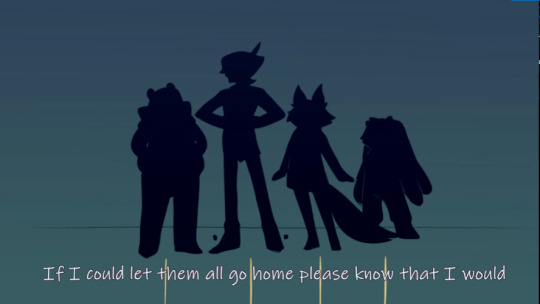
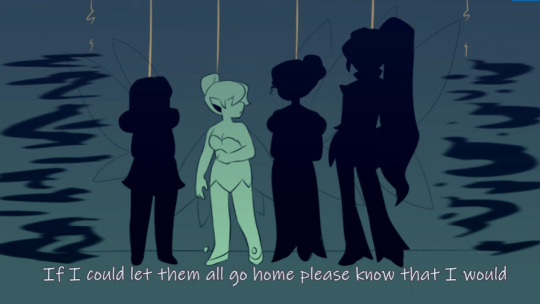
"If i could let them all go home please know that i would
But it'd do more harm than good"
Just Tink expressing her guilt that she and her friends kidnapped the lost boys so that they could keep existing, but like, JWHSEAJKHWED, she ofc doesn't want her or her friends to die, and since people are slowly not believing in fairies anymore, they're slowly going extinct, ALSO, Fawn and Silvermist are DEAD, so yeah, that messes with someones head
AAAALSOOOO, i LOVE their silhouettes, the height and weight differences instead of them all having the same height and weight like in the movies, plus, i LOVE that despite not looking like how they do in the movies, you can probably still tell who is who,
ALSO
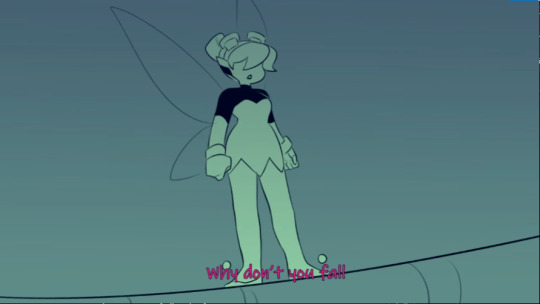
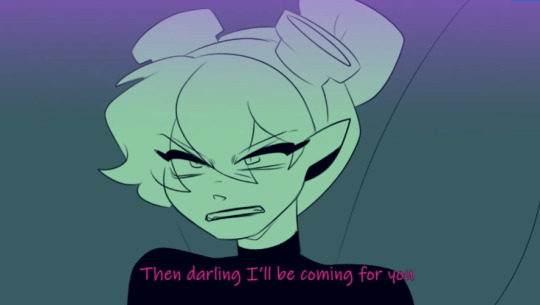
Even if it wasnt intentional, i like how in kinda faraway shots, Tink has a more cuter roundish look, while in closer shots shes more edgy and more intimidating(? if that's the right word), kinda showing how others view her (kinda?) as a cute fairy, maybe underestimated, but yknow, close up, shes plotting to kill a child
(1:15)

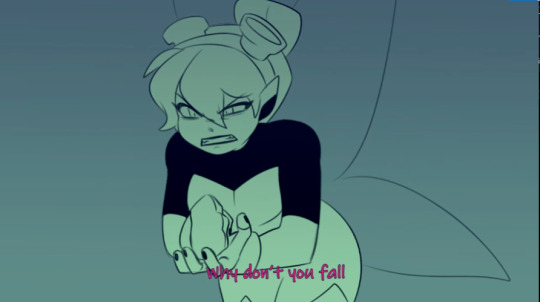
I love how Tink is gesturing in this scene, cause 1. It conveys to the audience what she wants from the lost boys and 2. Canonically, when fairies talk, people usually just hear jingling of bells, so shes gesturing because shes also conveying what she wants to the lost boys
1:23
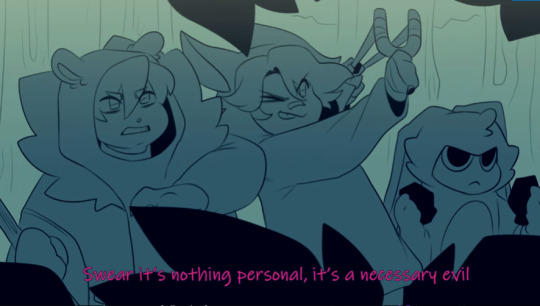
"Swear its nothing personal, its a necessary evil"
I just love this line because it is a necessary evil, she needs the lost boys and peter pan in neverland to believe in fairies so that they exist, and Wendy is pretty much a threat, since she makes the lost boys want to grow up with families,
Also, the lost boys look so cute in here, i cant remember their names tho, one is holding a slingshot, aiming at wendy, one is holding rocks , and one has a stick , so Tink just told these children to assassinate Wendy, or at least attack her.
1:35
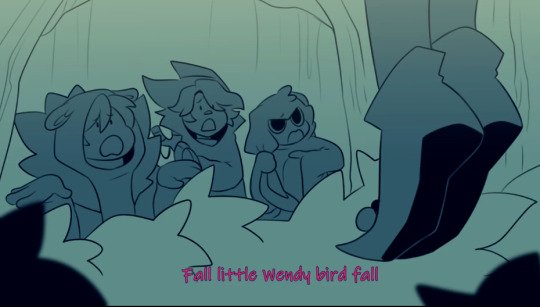
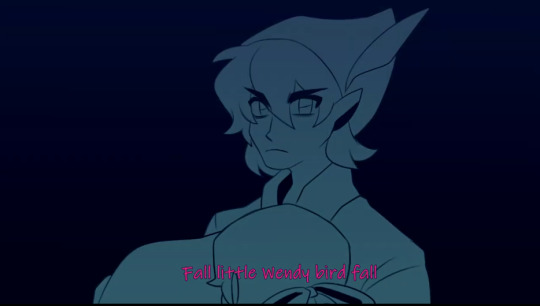
I love how the kids explain that Tink make them do it, and Peter Pan just glares at Tink, and i love that I'm pretty sure that Peter isn't mad/doesnt blame the lost boys
As seen in this scene where Pete is smiling and stuff at the Lost Boys and/or at Wendy
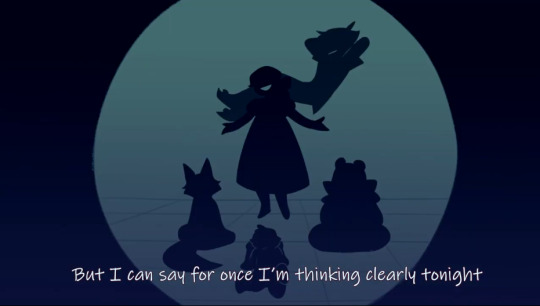
1:55
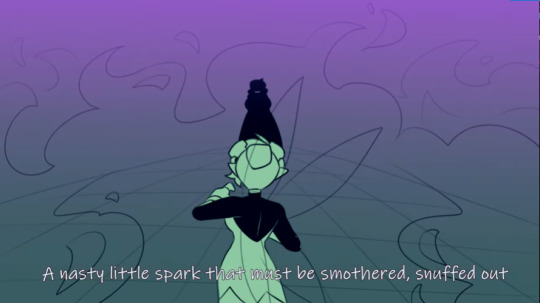
I love how Tink refers to Wendy as a "Nasty little spark" because, a spark can turn into a fire, damaging a lot of stuff and people, pretty much saying that Wendy has to be snuffed out before she causes a fire,

"Setting fires inside my house is just not allowed"
Pretty much referring to the fact that Wendy, the spark, is creating a fire, aka, making the lost boys want to grow up and go back to the real world, making them not believe in fairies anymore, thus, making her and her friends die, which is, not allowed.
Also. the fear in Tink's eyes is so fear, her expression is on point, the mix of concern and fear is just, so beautiful, also i love her pointed ears
2:17

First of all, this screenshot does not do justice to the actual design of the mermaid (siren?), cause they are AMAZING, BEAUTIFUL, GORGEUS.
Also, the fact that Tink is persuasive enough to convince someone to kill Wendy in such a short amount of time is impressive, and the fact that the mermaids agreed so quickly is also impressive,
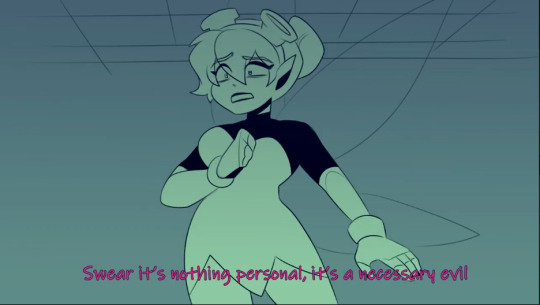
When it failed, the absolute horror and shock on Tink's face? Shes horrified that another plan of hers failed, and shes scared that her friends might die, like, wow
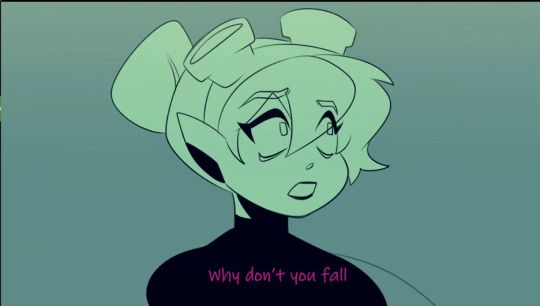
The despair on her face is just so...asdjwoaijdoiwajd
3:38
The fact that Peter Pan (i cant even give him a nickname cause Pete sounds different and P.P. is just wrong and Pan is just A Thing), first at the gust of wind that blows away the pixie dust (which keeps the ship afloat) he covered his eyes, maybe cause the dust or his hair in his eyes, then he looks at Tink in anger and shock and probably some confusion, then looks at Wendy, in concern and fear,
Theory: Pan knows that, since Tink doesnt want the lost boys to leave, and he knows that gust of wind was from the fairies, and Tink's dislike and hatred to WEndy, that Wendy was probably the only one not going to be saved, which is why he only looks at her and tries to save her (that or he's a SIMPPPPPPP /j)
3:50

The fact that you can see Wendy screaming??? Chills,

And the black screen right after, signalling Wendy's death is just amazing
Anyways, overall, what im saying is
THIS SONG IS AMAZING GO CHECK IT OUT, GO CHECK OUT THIS PERSONS CHANNEL, THEY HAVE GOOD VILLAIN SONGS, THEY EVEN HAVE ENCANTO!!!!
#Lydia the Bard#Villain Song#Villain Songs#Fall Little Wendy Bird Fall#song analysis#Though i did little analyzing but idk#GREAT SONG#TInkerbell#?#Youtube
275 notes
·
View notes
Text
I have an obsession with assigning theme songs to characters I like. Since Linked Universe is my current hyperfixation I realized I have a golden opportunity. Sleeping at Last is one of my favorite artists and he has an album called Enneagram. 9 songs for 9 personality types for 9 Links so without further adieu here is my totally flawed assignment of songs.
One - Warriors.
The list goes on forever Of all the ways I could be better, in my mind As if I could earn God's favor given time Or at least congratulations Now, I have learned my lesson The price of this so called perfection is everything I've spent my whole life searching desperately To find out that grace requires nothing of me
In the Swords comic Warriors admits that wielding the Master sword made him feel invincible and that nearly cost him his life.
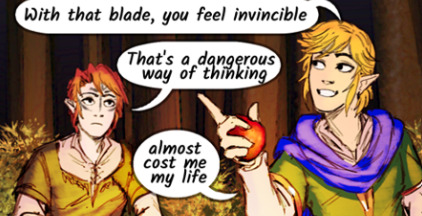
Now Warriors has learned that his true strength is his ability to work with others, a strength he brings to the chain. I see Warriors as someone that likes rules, he needs the world and people to follow a predictable pattern. That puts him at odds with the chaotic members of the chain (That’s everyone, including Warriors.) He’s a perfectionist, specifically the type of perfectionist that believes if you want something done right you’ve got to do it yourself. He’s learned to work with others, and has overcome his initial instincts as The Hero.
Two - initially I thought Hyrule was the best match for Two but as I was writing this analysis I changed my mind to Twilight.
Sweetheart, you look a little tired When did you last eat? Come in and make yourself right at home Stay as long as you need Tell me, is something wrong? If something's wrong, you can count on me
You know I'll take my heart clean apart if it helps yours beat
Twilight is running himself ragged. He was pulling double duty as Wolfie and Twilight. He’s trying to make Time proud, then turns around and tries to mentor Wild. A thankless task because Wild is not interested in his mother Cuccoing. He's more used to the mature blue eyed wolf that pushed him to his limits and never coddled him.
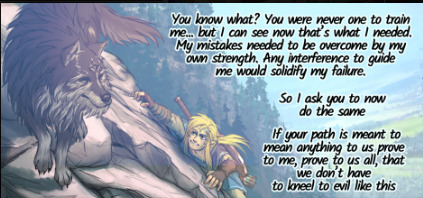
And in Twilight Princess he became The Hero to save his village. Mayhaps Twilight is a bit of a people pleaser but…
I know exactly how the rule goes Put my mask on first No, I don't want to talk about myself Tell me where it hurts I just want to build you up, build you up Till you're good as new And maybe one day I will get around to fixing myself too
Twilight recently had his heart broken when Midna left and shattered the mirror. Maybe he’s trying to avoid those feelings by concentrating on everyone else?
Three - Time and Legend were fighting back and forth with songs Three and Eight. Those two are very similar . Both young hero’s that had their childhood stolen in a single defining moment. Legend watched his uncle die and went on the run. Time drew the sword and woke up seven years later having slept through his childhood. And they’ve become pessimistic and cynical because of that.
And a nice little detail that shows how similar Time and Legend are is when Legend and Warriors were betting on who Time’s wife was. War’s thought it would be the princess. But Legend correctly guessed it was someone different because he knew that wasn’t Time’s style.
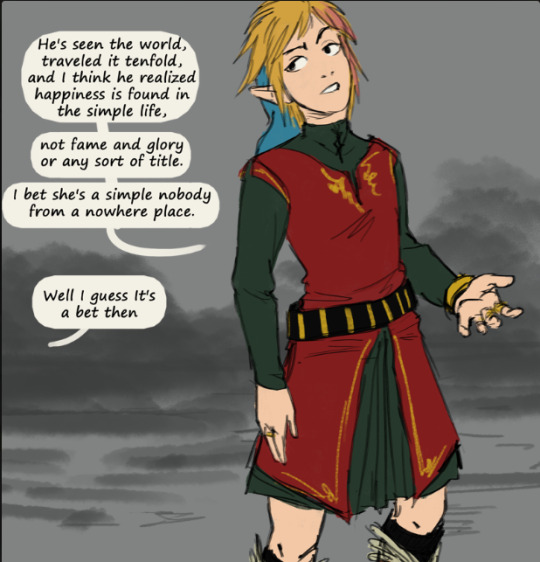
But back to Time, because these two are different and maybe that just because Time has the advantage of years and age on his side but he settled in a way Legend hasn’t
Maybe I've done enough And your golden child grew up Maybe this trophy isn't real love And with or without it, I'm good enough
Time is who he is because he has Malon and the ranch. Malon loves the very normal man Time is not The Hero he had to be. The others immediately notice how different Time is when they get to the ranch.
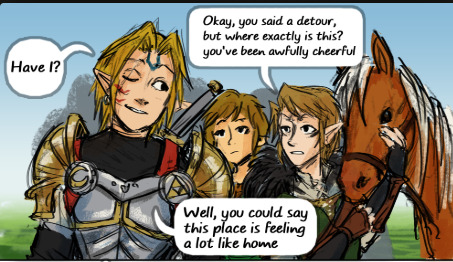
He laughs, smiles, and jokes around. While on the road he’s tense and serious. He sees this quest as a duty and a responsibility, but he wants to be home. Makes you wonder why he’ll leave home and die to become the hero’s shade?
Four - Is FOUR
Jk jk it's Sky. The song Four is about ordinary touching divine. And if that doesn't sum up Sky I don't know what does.
Bodies fashioned out of dirt and dust For a moment, we get to be glorious
When Sky first encountered Demise the Demon King spends a lot of time pointing out that Link is human, brave for a human but still human.
Then there are these lines
But I've fallen in love with a ghost I lost my balance when I needed it most
He loves Zelda, a mortal incarnation of a goddess and in his quest to save her he is so often just a little too slow. He's there in the end and gets the job done but it's a close thing that haunts him.
Five - For real this time. This is Fours song.
The opening lines are
I want to watch the universe expand I want to break it into pieces small enough to understand And put it all back together again In the quiet of my private collection
He's a curios little guy and a smith. Always looking into the mysteries of the world, take them apart and remake them. Maybe that curiosity got him into a little trouble. He's got the four sword and one magic sword is more than enough for him.
The last lines of the song are
I finally feel the universe expand It's hidden in heartbeats Exhales and in the hope of open hands
Four has got the four sword but he is also the hero of Minish cap. He see's the large universe and the small important things that are closer to home. He's recognized this after the events of sunset and dawn. If this quest is to succeed he needs to let his brother's in. Wild knows his secret but that was more of a spur of the moment angry reaction. I'll be interested to see if he purposefully reveals his secret to anyone else.
Six - Six was originally my pick for twilight but I switched him and Hyrule. Fanon characterizes Hyrule as the healer but so far we've only seen him healing once. So I'm basing this off of his games, Linked universe canon and my hopes for his character arc.
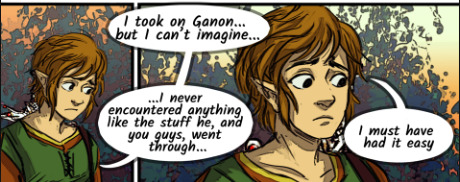
We laugh about this line because Hyrule has what is considered the hardest game. Oh you sweet summer child. You complicated, pixilated little hero. Do you know what you've done? That's why I associate these lyric's with Hyrule's character
I want to take shelter, but I'm ready, ready to fight Somewhere in the middle, I feel a little paralysed Maybe I'm stronger Than I realize
Like Legend Hyrule lives in the fallen hero timeline. That's caused some serious problems for his kingdom. But unlike Legend, Hyrule seems to be open and friendly.
Is it courage or faith To show up every day? To trust that there will be light Always waiting behind Even the darkest of nights
It takes real courage to live in a dying world and still love it and it's people.
Seven - There was never any doubt in my mind that Seven was Wild's song. Some of these were difficult to nail down but not Seven and Wild. This song is about being restless and wanting to explore. Perfect for our Hero of the Wild
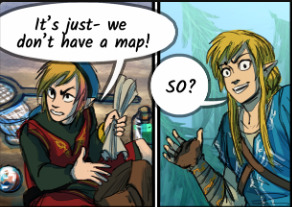
Then the song hits you with this sucker punch
But I want to be here Truly be here To watch the ones that I love bloom And I want to make room To love them through, and through, and through, and through The slow and barren seasons, too
Twilight has pointed out the Wild should talk to his Zelda about who he used to be and who he is now. But that means looking to the past and he's can't bring himself to do that yet. Instead seeing his life as two different people. The before and after.
Eight - I mentioned that I flipped flopped on choosing Time or Legend for this song but I finally decided that this is more Legend's song. Truth be told Eight could have been just about any Link's song. It's such a protagonist song. It's my favorite :)
Jojo has draw a picture of Legend with Marin and he looks so happy and playful. Something we don't see with the group.
But I can't let you see all that I have to lose All I've lost in the fight to protect it I can't let you in, I swore never again I can't afford to let myself be blindsided
He was open and loved once before but then he lost it. Not only lost it but had to be the one to destroy it himself, confront that maybe this happiness was never real to begin with. Now he's withdrawn and cynical. Legend is still all in on being a hero. (Unlike Time he's not looking to settle down.) But he wont be opening his heart anytime soon.
Can we talk about this panel from the bet
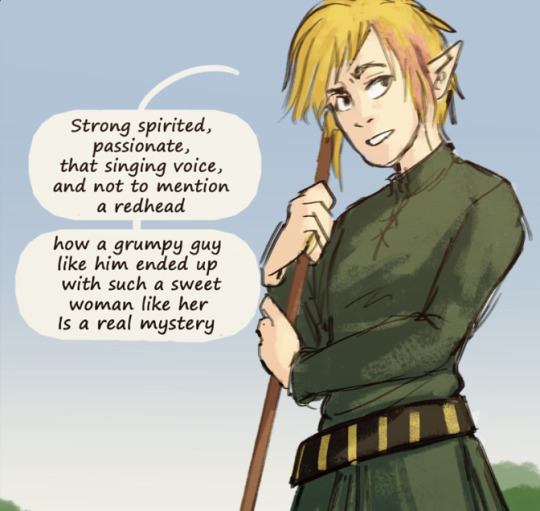
Are you talking about Time or yourself?
I'm standing guard, I'm falling apart And all I want is to trust you Show me how to lay my sword down For long enough to let you through
I can't wait to see his brother's break through that hard exterior and see the kind and empathetic person underneath. We see flashes of it.
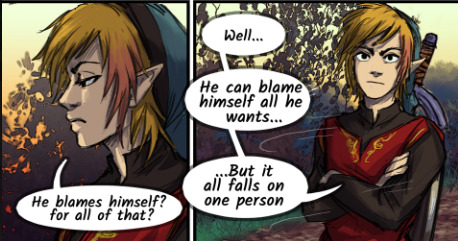
(Memories is a gold mine for everyone's characterization, just saying.) He's emotional mature enough to know where to really lay the blame. I hope he can help Wild see that. But I think to really get through to Wild he'll need to be emotional vulnerable and he's not prepared for that yet.
But in the end Legend is a hero through and through. Since he was 11 he's been The Hero and he shows no sign of stopping.
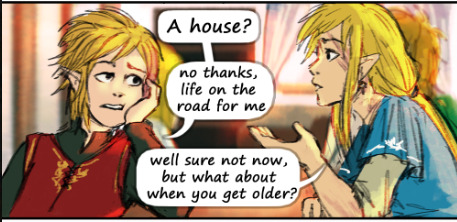
I'ma shake the ground with all my might And I will pull my whole heart up to the surface For the innocent, for the vulnerable And I'll show up on the front lines with a purpose
He's grumpy and cynical but still a hero.
Nine - By process of elimination Wind is number Nine. I'm not really happy with this one but none of the songs really fit Wind . So I decided to speculate about Wind's future. Wind and Tetra are supposed to reestablish the Kingdom of Hyrule, a daunting task for a 13/14 year old. No wonder he admires the kings of Hyrule so much
Wake up Fall in love again Wage war on gravity There's so much Worth fighting for You'll see Another domino falls Either way
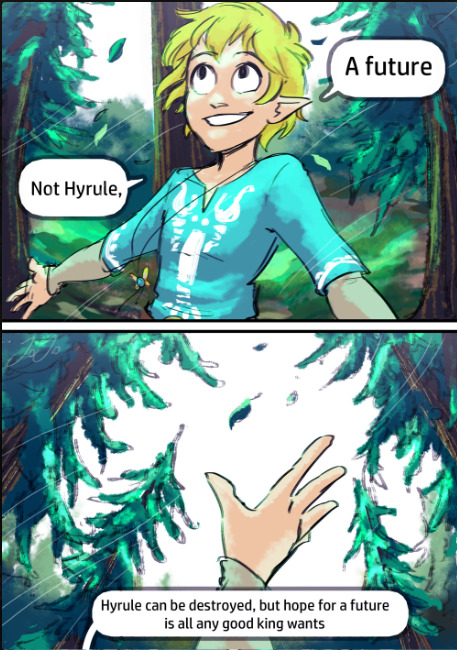
Quite the opposite of Wild , Wind is always looking to the past to build the future.
This ended up being longer than I thought it would be but I also didn't even talk about half my feeling when it comes to this album and Linked Universe. IDK how that possible. But I've said enough and I just needed to share my thought. And you guys should totally listen to the album.
#linked universe#lu warriors#lu twilight#lu time#lu sky#lu four#lu hyrule#lu wild#lu legend#lu wind#sleeping at last#song analysis#enneagram
77 notes
·
View notes
Text
A Complete Analysis Series of Finn Wolfhard’s STurn Playlist
Having Byler doubt? Read My Analysis!
I think it’s really important to take these songs as strong solid evidence for Byler considering Mike’s actor Finn, made this playlist for ST5
Preview Brief/Intro: I will be doing One Song at a time (one each post), I will be going in order on Finn’s playlist. This is all my ideas and interpretations of what I think each song represents and tells us. I will try to post each as soon as I can. With that pls have fun reading my analysis.
1st Song we will discuss:
Starter Notes/Thoughts: As I’m listening to the first song I feel like this song goes in order from when Mike arrives in California to the end of season 4. Also this whole song is in Mike’s POV
Key: Italicized - Lyric | Normal - Analysis
No one saw, nothin' at all
‘No one saw’ how we was being hella awkward with Will at the airport (I mean they did see but Not to Mike’s pov, he was probably thinking: they saw nothing, stay calm)

No law was there to fight
I’m thinking this could mean ‘the law’ being like ‘liking boys is bad/homo is a sin’ but now that he’s in California there is no law to fight bc he’s out of Hawkins (a town that is not so gay friendly), so basically his feelings for Will are so much more obvious
All dressed down
This just refers to what he was wearing at the airport and how he was caught lacking trying to fit in, trying to be normal…not gay…But! His mask is slipping remember bc he’s in California where there’s no law that being gay is a sin, he’s just used to Hawkins law (law is just used as metaphor here)
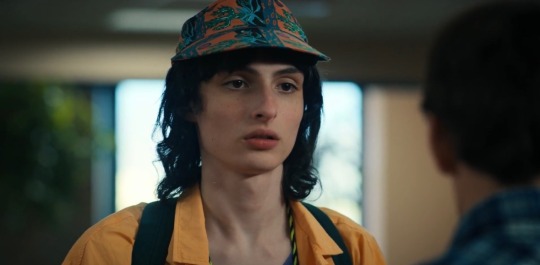
Walkin' out in the California night
Literally mentions California, he’s in California, and as he’s walking out to California- (ignore the night part) he’s walking out of the airport to California. And as he’s walking he’s trying not too look at Will and bearly talking to him—he thinks the next lines:
"Hey kid come along, something is wrong
I believe you know
^ voice inside Mike’s head being like: Ik ur upset AND ik you know why. This is such a good line to represent Mike’s internalized homophobia, the line basically saying: Ik something’s wrong, it’s the fact that you like… but he can’t really admit that he likes Will yet, bc that line is his inner voice pushing him to actually accept it. He probably heavily thinks this at rink-o-maina too.
All this to say
Only one way that this can go"
Cont. with his inner voice—So ‘all this to say’ stating what was said in the previous lines, like defining it, making it important. Then, the only one way that this could go…that being accepting his feelings for Will!

"Come on with us for a ride
Step on inside the long black car
show you the meaning of hell
‘Hell’ is important bc ppl think if ur gay u go to Hell.. Then what it’s actually saying: the journey of Mike Wheeler going on this long road trip with Will to get El, and it will be like Hell trying to figure out his feelings and the struggles and challenges that actually arise in the show, also him trying to figure out what Will meant in his speech in the van.
Boy, just let me tell you, that's where you are"
Basically just a reference to being gay is a sin and he’s already in Hell for liking Will
My heart won't beat
'Til we meet again together
Oh, don't cry
Keep me on your mind forever
These 4 lines are when Will gives his speech to Mike.
1st 2 lines: is like Will’s convincing Mike that El needs him and him trying to fix their relationship, so Mike thinks his heart won’t beat till he see El again- but this just him faking it to make it and bc he’ll do anything Will tells him too 💀
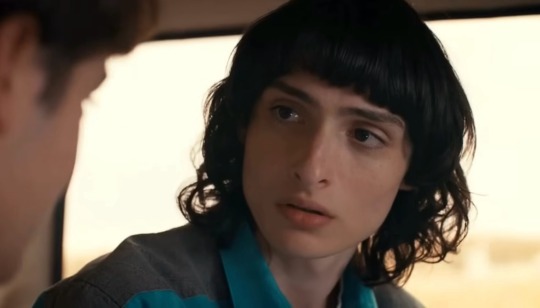
2nd 2 lines: Mike knows that Will was crying in the van, he doesn’t want to lose Will, so he wants Will to keep him in his mind forever

I found a new song, pulls me along
To that other plane
I'll see you some time
Off down the line
Where it never rains
Honestly I’m not as confident in these lines’ analysis’ as I was in my other ones so just keep that in mind:
I think this is after that interaction when he reunites with El and does that look scene between her & Will and he realizes then that his heart never stopped beating but it did stop when Will was smiling at El and not him.
These lines are him moving on from El
The last line: ‘where it never rains’, I want to believe this is about him not wanting to get into any more fights with Will bc Mike associates the Rain with fighting with Will
I put my foot in the gas tank
For the last time I know
For the last time he knows, finally that he has accepted his feelings now for Will
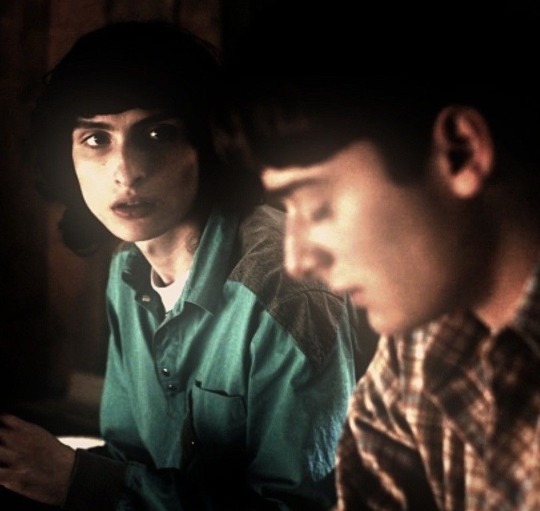
I'll be right by your side
From Paradise to El Paso
Reference to when Mike says to Will we’ll defeat him together in the last Ep of ST4
Also reference of when they were traveling— hence ‘side by side’— to go get El
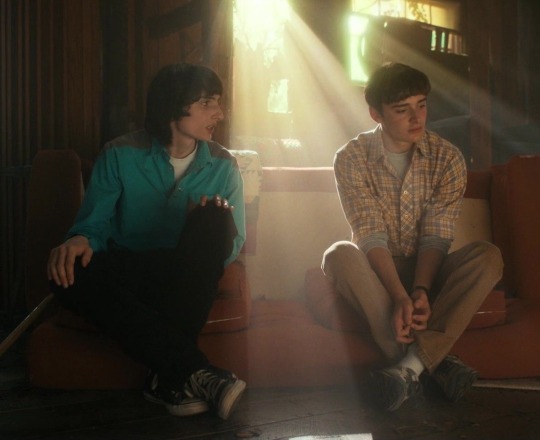
Ending Notes/Thoughts: See how it went in order through the whole of season 4 in Mike’s POV, I just think that’s really cool. Finn sure did know what he was doing with this playlist that’s for sure lol
Finn’s Playlist:
Thank you for reading,
- Stasia ♡
#i’m really proud of this#more to come later#STurn#finn wolfhard#Finn wolfhard playlist#analysis#byler#byler analysis#byler endgame#byler canon#stranger things season 4#stranger things#stranger things season 5#byler theory#byler proof#will byers#mike wheeler is gay#mike wheeler#will x mike#mike x will#miwi#ik what u are mike wheeler#song analysis#Spotify
74 notes
·
View notes
Text
AFTER AN OVERWHELMING WAVE OF SUPPORT AND ENCOURAGEMENT, I'VE DECIDED TO POST THE WILL WOOD ESSAY!!!! it's below the break !!!!
I would like to really quickly state though that this essay is my property, I put a lot of time and effort into this, so please don't claim it as your own !!!! thank you <33
I will be analysing Will Wood’s song ‘Suburbia Overture / Greetings from Marybell Township! / (Vampire) Culture / Love Me, Normally’. which, for simplicity, most fans refer to as simply ‘Suburbia Overture’. This song is the first on his first solo album entitled ‘The Normal Album’, which came out in July 2020.
This song, in the most general possible terms, is a criticism of modern suburban life, how it is advertised as “the perfect life”, and how this advertising is incredibly false unless you fit the picture perfect standard that these facets of society seem to require.
The song itself is split up into 3 distinct sections, "Greetings from The Marybell Township!", “(Vampire) Culture” and “Love Me, Normally”. I'll be tackling each section one at a time in order to properly break down what each means, what different analogies they use, how they all relate to each other and the intended end result of the song and the message it intends to convey.
Let's begin with 'Greetings from The Marybell Township!'.
This section of the song uses a lot of analogies that compare suburban life to a warzone, the first line of this section being “white picket fences, barbed wire and trenches”. This section also focuses heavily on the concept of the nuclear family, and it often literalises the term and uses analogies based around radiation and nuclear warfare. Such analogies can be found in lines such as “the snap crackle pop of the Geiger, camouflage billboards for lead lined Brookes Brothers”. Now there's a couple of terms that require definitions in this line. The first of course being “the Geiger”. A Geiger counter, which is what this lyric is referring to, is a tool used to measure levels of harmful radiation. This, paired with the concept of billboards advertising “lead-lined Brookes Brothers” when lead is a material used to deflect radiation, and the knowledge that ‘Brookes Brothers’ is an American vintage style clothing brand, this line really paints a picture of a seemingly post apocalyptic/post nuclear war but still consumerist and capitalistic suburban society. The last line in that verse is “buy now or die”, which ties back to the concept of safety equipment being advertised on billboards, while residents of this town have no choice but to buy the products. This all relates back to the hyperconsumerism that plagues our society, and runs particularly rampant in middle to upper middle class neighbourhoods. The very same neighbourhoods that are often referred to as “suburban”
In the second verse of this section there are a lot of hard hitting lyrics that to me really show that this perfect idealised life is far from perfect or even good, so we will work through them one by one because I feel that they all deserve proper analysis.
The first line that i want to point out from that verse is the line “takes a village to fake a whole culture” which is clearly a rip off of the phrase “it takes a village [to raise a child]” but it also references the fact that usually suburban towns are incredibly monotonous in both residents and architecture, and so it takes the collective effort of the entire population of the town to pretend that there is an actual culture to it.
The next few lines I'll speak on all come in quick succession of one another, essentially blending them into one line.
“Your ear to the playground, your eye on the ball, your head in the gutter, your brains on the wall.”
So let's break these down. This line is easily split into 4 distinct phrases, and all of these phrases have a few things in common, which I will point out later.
“Your ear to the playground” is a play on the phrase “ear to the ground” which essentially means that the person with their ‘ear to the ground’ is attempting to carefully gather intel about something. Someone having their ear to the playground simply reinforces the idea of this suburban “paradise” being. Not as paradise-y as one would hope, seeing as the people who use playgrounds most of all are children, so this line is demonstrating that the picture perfect life that this suburban town offers is actually corrupting children so young that they are still on the playground.
The next phrase is “your eye on the ball” isn't a play on anything and is in fact in itself a common phrase. To have your eye on the ball means to be entirely focused in and paying attention to something, and not allowing anything to divert your attention. Given the last line this line very well could be another reference to the corruption of the youth and the idea that their every day play has already been tainted with the hostilities of modern life usually reserved for adults.
Following this is another well known saying “your head in the gutter” which, as most know, someone whos head is ‘in the gutter’ is someone who will see some sort of innuendo or otherwise vulgar/inappropriate meaning in something that was intended to be entirely innocent, leading to others in the interaction telling the perpetrator to ‘get [their] mind out of the gutter’
And finally, in my opinion the most hard hitting phrase in this set, “your brains on the wall” which is clearly in reference to the notion of ending your own life with a shot to the head, which would lead to, well, brains being on the wall. These last 2 phrases come in stark contrast to the seemingly picture perfect life that suburban towns offer and advertise, the concepts of suicide and perversion are not concepts one expects to see or hear when imagining this idealised form of life.
There is one main similarity in each of the 4 phrases, that being that each phrase has some body part being on something else, your ear to the playground, your eye on the ball, your head in the gutter, your brains on the wall. This similarity almost offers a body horror aspect to the song, which when paired with the concept that this is written about a seemingly post nuclear apocalyptic town presents an interesting idea of possible mutation, but i'll be the first to admit that may be a little far fetched. However that's not the only similarity that these 4 phrases share, another is the fact that they are all directly, or only slightly modified versions of already well known phrases, a similarity that is found in many lines over this entire song, through all 3 sections.
I want to analyse a few more lines before we move on to the second section of the song.
This next line comes directly after the previously analysed line, and it goes “home is where the heart is, you ain't homeless, but you’re heartless”
Sticking with the theme of using already existing and commonly used phrases, “home is where the heart is'' is once again a phrase that you could likely find as a cross stitch hung up on the wall of any of the homogenous houses you could likely find in this idealised suburbia. But what Wood is saying in this line is that home is where the heart is, and that while people in this town may not be homeless, they are certainly heartless, meaning that they in fact don't have homes. They have houses. Rows upon rows of houses that all look the exact same in the horrifying monotony that is suburban living.
Following this line is the lyric “it's the safest on the market, but you still gotta watch where you park it”. These lines seem to be in reference to buying a car. The car being the "safest on the market" is likely in reference to the fact that it may have a lot of safety features. But this is immediately negated by the fact that you “still gotta watch where you park it” meaning that the safety features could be a reason that the car gets stolen, rendering all the safety that those features offered useless because in the end it made the car and the owner less safe.
In the third verse of this section, you immediately hear the line “so give me your half-life crisis” which partially is a play on the term ‘mid life crisis’ wherein which one realises that they may have wasted their life up till that point and they're already halfway through, but the use of the term “half-life” instead of ‘mid-life’ is very intentional, as the term “half-life” can also be used to refer to the half-life of an isotope, which is the amount of time that isotope takes to lose half of its radiation, which ties back into the theme of radiation that we see mentioned a lot in this section.
Later in the same verse is the line “if it's true that a snowflake only matters in a blizzard”, which is interesting in a few ways, first, it brings up the idea of a singular individual means nothing on their own and that they only matter when they’re part of something larger or a larger group, but i also think that the use of the terms “snowflake” and “blizzard” instead of something like ‘raindrop’ and ‘storm’ is very intentional in the fact that snowflakes are known for being individual, none are alike, every single one is different. So saying that a snowflake doesn't matter unless it's in a blizzard is yet another hit at individuality, essentially implying that in this town individuality means nothing and is essentially rendered useless.
The final line in this verse is “everybody's all up in my-” repeated thrice, and on the third time the sentence is finished to say “everybody’s all up in my business” and before the word “business” can be finished its overlapped with the beginning of the chorus, the first word of which is a very loud “SUBURBIAAAA!”. I believe this is reminiscent of the fact that in towns like this, everyone cares so much about what everyone else is doing, they’re all so interested in everyone else's business, and i think that sentiment being stated and cut off by the word “Suburbia” is essentially saying that ‘this is the norm, this is just Suburbia, this is how it works around here.’
After the final chorus of this section, in the final verse, you'll find the line “chameleon peacocks are talk of the town” which particularly interests me because if you know anything about chameleons or peacocks you’d find that they seem incredibly different as animals. Chameleons blend into their environment in order to stay safe, whereas peacocks are known for parading around bright colours to make themselves look better, but if you think about it the term “chameleon peacock” actually makes a lot of sense, a person who blends into their surroundings in order to make themselves look good. This sentiment seems to perfectly describe the homogeneity of the people that live in these perfect towns, they're all the same, they blend in with one another in order to make themselves look good, or perfect.
Another line heard shortly afterwards is the phrase “he cums radiation”, rather vulgar, I grant you, but it's important because it is yet another literalisation of the phrase ‘nuclear family’. It could also be a reference to the general toxicity of this societal norm.
The final line in this section of the song is “the dog bites the postman, as basement eyes dream of a night at the drive-in, with an AR-15”. Which is another use of juxtaposition, intended to cause a kind of whiplash in the listener and reinforce the idea that while in this place there is scenarios that would happen in a hollywood movie esque picture perfect neighbourhood, like the dog biting the postman, there's also horrors that lurk below the surface. (although clearly not TOO far below.)
Now let’s move on to the second part, ‘(Vampire) Culture’.
If you listen to the song, you’ll immediately be able to recognise where 'Greetings from The Marybell Township!' ends and ‘(Vampire) Culture’ begins, due to the insane juxtaposition between the two. Where 'Greetings from The Marybell Township!' is soft and sort of reminiscent of the 1950’s, ‘(Vampire) Culture’ is loud, jarring and grotesque, complemented with much raspier and strained sounding vocals compared to 'Greetings from The Marybell Township!' ’s soft and melodic ones. The tone for this section of the song is immediately set with much more graphic lyrics, the very first line of this section (after the opening scream) is “i dropped my eyeballs in the bonfire, we fucked on a bed of nails” which absolutely sets the scene for how different this section will be to the previous.
This song immediately jumps into using cannibalism as a metaphor, with the first line after the jump start opener being “I caught kuru from your sister, and I'm laughing in jail”. While this line is written to sound like the concept of catching an STD from an act of adultery, Kuru is actually a disease only found in human brain tissue, meaning that you can only contract this disease by eating a human brain, and what's one of the symptoms for this disease? Uncontrollable laughter.
This use of cannibalism as a metaphor is used again immediately after in the line “smell those screaming teenage sweetbreads on that 4th of July grill”, ‘sweetbread’ is the term used to refer to the pancreas and thymus gland of an animal, usually a lamb, but in this particular case it is in reference to the human teenagers that supposedly lived in The Marybell Township, or a least they did before they were dissected, cooked and served at a neighbourhood 4th of July barbeque hosted by the same people that were once referred to as their neighbours.
This line adds an interesting level of patriotism to the song and criticism of how America utilises patriotism and their love for their country as means to justify harming the youth, however a 4th of July neighbourhood barbeque is also commonly associated with white picket fence gated community America, which ties us back to the base criticism of that style of life and how it is seen as the “proper” and “perfect” way to live.
These cannibalistic sentiments are followed up with the line “smile and wave boys, kiss the cook, live laugh and love, please pass the pills.” which brings us back to the repeated use of commonly known sayings being taken directly or modified only slightly to remind the listener of the setting were in, that being a seemingly 1950’s era tight knit neighbourhood.
Phrases like “live laugh [and] love” or “kiss the cook” are both phrases that could easily be seen in a setting like this, especially “kiss the cook”, as this is a phrase commonly associated with aprons worn by grillmasters at neighbourhood barbeques, not unlike the cannibalistic 4th of July barbeque that this particular neighbourhood seems to be hosting.
These phrases being immediately followed up with a sentiment such as “please pass the pills” serves to entirely undermine the pleasantries that, until a moment ago, seemed to be plastered all over the faces of the people living in this fictional town that Wood has created. I think that final phrase brings the listener back to the realisation that not all is right here, quite the opposite in fact, and drags them from their momentary paradise.
Circling back very quickly to the phrase “smile and wave”. I felt the need to point out that this phrase has been used for centuries as a way to say “stop talking and act normal” which once again reinforces that these people are pretending to be something they’re not in order to fit in.
We enter the next verse with the repeated phrase “it's only culture”, after that line is repeated three times we hear “sulfur, smoke and soot”, which could either be a reference to how dirty and disgusting the ‘culture’ is, or it could be a different way of saying that this culture and the people participating are going to hell, as per the common phrase ‘fire and brimstone’ and the fact that sulfur is another way of saying brimstone, and smoke and soot are both byproducts of fire.
The last line of this verse and the first line of the chorus blend into each other, so I’ll speak on them both.
First, the last line of the verse. It goes “you cocked and sucked your lack of empathy, pulled the trigger with your foot to prove you've got-”
Putting aside the clear innuendo, this line refers to the idea of ending one's own life with a long shotgun. According to the media, by the time the gun is cocked and the barrel is in your mouth, you're not able to pull the trigger with your hands due to the length of the barrel. This line instead presents the solution of pulling the trigger with your foot to end your life.
So this person “cocked and sucked” the gun (cocked the gun and put the barrel in their mouth) before pulling the trigger with their foot to prove they’ve got-
And here's where the verse blends into the chorus.
Because the first line only consists of one word.
“Blood”.
The person who was shooting themselves with a shotgun only to prove that they bleed. Which is where the title of this section comes in. “(Vampire) Culture”. This section seeks to portray either the people in this culture or, the more likely option, the culture itself, as metaphorical vampires, who aim to destroy those around them. This knowledge makes the next line “didn't they want your blood, so why apologise for being blue and cold” make a lot more sense. After all, if these culture vampires have drained you of your blood, is it not their fault that you’re now “blue and cold”, as bodies tend to be if they lack blood flow. However, if you look at synonyms for the words “blue” and “cold”, you could also interpret this phrase as meaning “sad and apathetic”.
A sad and apathetic person doesn't seem to be the kind of person this ‘culture’ seeks to enlist however, and so one who is “blue and cold” is shunned as an outsider.
What Wood is getting at is that if this culture is the one who made you sad and apathetic, then you should not apologise to it for being so.
The next verse is short, and like the previous one, also blends into the chorus in the same way, by having the last line of the verse cut off right where the chorus would finish the sentence with the word “blood”. However in this verse, there's an interesting line. “It's only culture and it's more afraid of you than you are of it”, which is a sentiment usually used by adults to attempt to subdue a child's fear of something, usually insects. However it's interesting in the fact that it brings up the idea that this culture that has caused so much damage and harm is actually incredibly fragile, and would, in theory be very afraid of the concept of the individual, because if this ‘culture’ is only being held together by the silent agreeance that everyone will simply pretend, then the idea that there is people who refuse throws the whole idea into jeopardy.
This line is followed up however, by the line that blends it into the chorus. “Go on drink that-”, clearly intended to be finished by the first line of the chorus, making the full line, “go on drink that blood”.
This line is in reference to the phrase “drink the kool-aid” which essentially means to pledge your undying loyalty to something, a concept, a person, a god, etc. and it derives from an infamous mass cult suicide where over 900 people drank poisoned Kool-Aid and subsequently died for the cult. It is not a far cry to believe that this event and this phrase is what the line is referring to, as it's something that Wood has referenced in other songs, so it only makes sense to believe that this is what he means here.
After that chorus we move on to the bridge, which begins by listing 3 pairs of names, all famous or semi famous, and each pair being similar in one right but opposite in another, the line goes as follows; “were you Nabokov to a Sallinger, were you Jung to Freud or Dass to a Leary”, so let's break down these pairs one by one.
First “Nabokov to a Sallinger”, these names belong to Vladimir Nabokov and J.D. Sallinger, both authors who wrote famous books that both surround the theme of innocence, but in very different ways. Nabokov’s book “Lolita” is a story told from the perspective of a grown man about his sexual obsession and attraction to a little girl, and his desire to ruin her innocence, exploring the theme of innocence in a grotesque and frankly horrifying way, which is in stark contrast to Sallinger’s book “The Catcher in the Rye”, which explores the topic of innocence through the main characters desire to preserve their little sisters innocence, and in that desire displays hesitancy at the idea of sex themself. Both books explore the topic of innocence, however while one seeks to preserve it, the other seeks to destroy it, two sides of the same coin.
The next pairing is “Jung to Freud”, meaning Carl Gustav Jung and his mentor Sigmund Freud, who once again are similar in one right, but opposite in another. Jung and Freud both had theories on the nature of the human mind, but where Jungs was all about the concept of spirituality and how that ties into the collective unconscious, Freud's approach was much more focused on the individual unconscious and the concept of sexuality.
The final pairing is “Dass to a Leary”. both psychologists, both at the forefront of the ‘Harvard Psilocybin Project’ (before they both got dismissed from harvard entirely following controversies around the project) Richard Alpert and Timothy Leary were both psychologists and eventually authors who studied the effects of psychedelic drugs on the human mind, and while they were co workers they ended up with pretty conflicting views. Dr. Richard Alpert, who apparently ‘died’ and was ‘reborn’ as spiritual guide Ram Dass, centred his teachings heavily around the concept of living in the moment, (in fact his best selling book, written in 1971 was titled ‘Be Here Now’) and he believed that psychedelic drugs were not needed and that a permanent version of the same effects could be achieved through meditation. Whereas Dr. Timothy Leary advocated heavily for the use of psychedelics, believing that LSD specifically had great potential for therapeutic psychiatric use.
All of these pairings and examples utilise the concept of duality and speak on how every coin has two sides, which can easily be tied back to the idea that the picture perfect suburban life is just one side of the coin. This idea is then reinforced by the next line, “were you mother, daughter, subject and author?”, The use of the word ‘and’ here shows that it's possible to be two sides of the same coin at once, just like how this town, which is perfect on one side of the coin, is still terrible on the other side of the coin. The line is stating that it's possible to be both at once.
The very last line in this section is; “you don't make the rules, you just write them down and do it by the book you throw around”. This line combines a few relatively well known phrases. The first being of course ‘i don’t make the rules’, which can have two distinct meanings. The first is to express a kind of sympathy for someone being punished, and the second is to absolve yourself of the blame for that person being punished, a sort of ‘don't shoot the messenger’ situation.
The ‘rules’ that are likely being referred to here are the societal norms and expectations forced upon people who reside in these towns, the standard for ‘perfection’.
However, following this sentiment up with the phrase “you just write them down” is essentially saying that while it's not the fault of the people in these towns, they didn't create the norms, they still enforce them. They expect everything to be in line and perfect at all times, they follow these ‘rules’ to a T, and they shun and punish anyone who doesn't fit the standard and/or refuses to follow these ‘rules’, which is where the line “do it by the book you throw around” comes in, doing something ‘by the book’ means to follow rules strictly and to the letter, nothing out of line, and to throw the book at someone means to punish them as severely as possible, usually used in the legal sense to mean punishing someone for their crime as severely as the law will allow. So in all, the lyric “you don't make the rules, you just write them down and do it by the book you throw around” ends up meaning ‘you didn't create these norms but you still enforce them by following them to an absolute T and punishing anyone who doesn't.’
With that we enter the third and final section of the song, entitled ‘Love Me, Normally’, a title it shares with another song on the album, but of course this song is partially meant to serve as an overture for the whole album, meaning it shares some similar lyrics with lyrics from other songs on the album, so sharing a title isn't all that surprising.
The first lyric in this section is “do you know the difference between blazing trails and slash and burn?” which is another instance of duality in this song. Trailblazing or being a trailblazer means doing something no one has done before, paving the way for other people to follow in your footsteps, it comes from the literal act of creating a trail in the woods for people to follow, usually by creating notches in trees or setting small fires, hence ‘blazer’, as blaze is another word for a fire. However “slash and burn” is a method of deforestation that involves cutting down and burning a section of forest to create a field. Both examples include using fire to change something, but where one is seen as progress and positive, the other is negative, and seen as a means of destruction. Once again, two sides of the same coin, innovation and destruction.
This is followed up with the line “going against the grain and catching splinters”, which is a line i particularly like because while it is something that literally can happen, if you run your hand along wood in the opposite direction to the grain, you're more likely to get a splinter because you're essentially pushing your hand against the chips of wood, but it also is another metaphor for the dangers of not being the same. Going against the grain in this instance means daring to be different, not going the same way everyone else is going but instead the opposite of that, and in this example splinters are the consequences one would face for being different, especially in a setting like this perfect town, where everyone is the exact same as everyone else.
A little bit later you hear the line “well Lot he had his lot in life, Job his job and i guess you’ll too, and die”.
Lot and Job are both figures found in the Bible, whose names both share spelling with common English words, but are pronounced slightly differently.
Job, from the Book of Job, was a man that was tested by God, made to suffer to test his loyalty, his ‘job’ was to believe unendingly in God and see Him as always correct no matter what.
Lot, from the Book of Genesis, was a man who went through a lot, and the phrase ‘my lot in life’ is a phrase commonly used by people to write off/explain why they don't have it as good as others, they say it's simply their ‘lot in life’.
The end of this line “i guess you’ll too, and die” i believe refers to the fact that everyone will have their own job and their own lot in life, and then everyone in the end will die.
This theory is solidified by the fact that the next line is “The Lord looked down and said ‘hey, you're only mortal’” which is a play off of the phrase ‘you're only human’. Wood himself said that the phrase ‘you're only human’ has always felt weird to him, he says, “cause like, of course I am, aren’t we all? How is that fact supposed to help? I still feel bad. What does being human mean to you?”. He follows this up by saying that the idea of God saying "hey, you're only mortal" offers the same kind of sentiment, but in a “cosmically condescending” sort of way.
The following line reads “giveth and taketh away, till things come out a certain way, leave you wondering when they might go back to normal… leave you wondering why they can't have just been normal”.
This line presents a sort of hopelessness in the realisation that things are constantly changing, nothing is any more ‘normal’ than anything else, there's no such thing as ‘normal’, which is an overarching theme found throughout the album. Once again bringing back the fact that for all intents and purposes this song is an overture for the rest of the album.
To conclude, ‘Suburbia Overture’ is, in my opinion, one of the greatest criticisms of suburban, middle class, gated community, nuclear family life i've ever seen, it highlights the problems in that life and showcases how this kind of lifestyle in its incredibly rigid and restrictive standards is incredibly harmful to the very concept of individuality, because the expectations and unspoken rules set in communities like this and the widespread idea of forced normality seeks to crush any individuality before it even has a chance to blossom.
The use of metaphors and phrases that are well known and are likely to be seen in settings such as this gated community suburban town that Wood has created really paint a subconscious picture of what this community looks like, the use of duality, how every story has another side, and how nothing that is seemingly perfect from the outside is actually perfect on the inside.
Will Wood is an incredible lyricist and the fact that he was able to cram so much symbolism and such a powerful message into a song just over 6 minutes long is genuinely incredible.
Thank you for listening to my/reading my autistic hyper fixated rambling, i hope i didn't melt your brain too badly <3
#onyx fandom posting#onyx is rambling#will wood#wi wo#wee woo#will wood and the tapeworms#wwatt#wwattw#will wood the normal album#the normal album#will wood tna#suburbia overture / greetings from the marybell township! / (vampire) culture / love me normally#suburbia overture#greetings from the marybell township#(vampire) culture#love me normally#essay#analysis#song analysis#<33#:3
184 notes
·
View notes
Text
Something I noticed in NPMD I don't think anyone has noticed
Now Peter's line from cool as I think I am "if I can finally be cool I will know that I'm not a loser " is repeated over and over again in the whole show. Not only is it the first note you hear in the first song but is a line that comes up in all the losers song BUT THATS NOT ALL THERE'S A PATTERN
in as cool as I think I am obviously is the first time we officially hear when Peter is trying to convince himself he's not just a dork but at the end he goes " but is that who I think I am?" And before he can process it he's interpreted by max. And while nerdy prudes must die isn't Ricky's song technically it still follows something similar when Max is taught Ricky he has a moment of bravery and straight sings along with the chorus "I'm not a loser" before max interrupts him and later kills him. Then in just for one Ruth doesn't actually sing "I'm not a loser" but when she's singing the high notes at the end you can hear the melody of "I'm not a loser" playing before she stops in shock at herself and refusing to go that high again. And finally in dirty dudes must die the chorus sings in the back as grace goes fucking insane
BUT THATS WHEN THE PATTERN IS BROKEN the way it goes it usually just stops at I'm not a loser but not with grace SHE GETS THE SECOND VERSE GOING 'I AM THE RULER' BECAUSE THATS WHAT SHE IS NOW
She's in the exact same position max was in everyone lives in her hand,the power of the Lord's in black, she's a god now
She is THE ruler
#im so clinically insane#nerdy prudes must die#starkid npmd#npmd#grace chasity#peter spankoffski#ruth fleming#richard lipschitz#max jagerman#song analysis
74 notes
·
View notes
Text
I was relistening to Mutiny today, and the more I go back to it, the more I get stuck on the line near the beginning where Eurylochus is asking Odysseus to explain/deny what just happened
Every time I listen, it sounds less like a dare or a jab, and more and more like he is begging his friend to convince him that Scylla didn't just happen. He is *begging*. He's not angry right there, he's desperately reaching for the security of a captain and friend who can talk his way out of any problem, and he is begging Odysseus to make it better
But Odysseus can't. And he won't deny what he's done. Because even if it was to get him and the majority of the remaining men home, there's nothing he can say to justify not warning them ahead of time. So there's a mutiny. And then it's history.
#epic odysseus#epic eurylochus#epic the musical#jorge rivera herrans#eurylochus#odysseus#scylla#mutiny#epic the thunder saga#thunder saga#song analysis#they make me ill#the odyssey/EPIC are going to be the death of me I Swear#both versions of this story make me physically ill but i'm in too deep and love them too much to back out lmao
68 notes
·
View notes
Text
I have very complicated feelings for the Vengeance Saga (after the first listen)
Disclaimer: I will only criticize Epic the Vengeance Saga as a work on its own, not for its inaccuracy or deviation from mythology and The Odyssey. There are more knowledgable people who can point out and analyze the changes in Epic the Musical, but that is not what I'll be tackling here.
To put it bluntly, I'm not being angsty about it as I should. The whole saga just... didn't feel right with me.
Now, first off all, I'm a big fan of Epic and had been following it since the Cyclops saga (first version). I've been in love with many songs and hyperfixed it for months on end. But when the Vengeance saga came along, I didn't feel that same bubbling love rise in me.
Even as a fan, this isn't my first time having peeves with Epic. I didn't jam with the re-release sagas for a while, I'm underwhelmed with the Circe VS Odysseus fight and other issues, very unpopular opinion but "Monster" wasn't too impactful to me, and also the God Games (especially Zeus' attack).
The Vengeance Saga though? Well, they say we gotta do the Bun-Meat-Bun (or whatever the hell its name really is) technique when giving criticism, so I'll start with the good parts.
I love that Odysseus looked so done with Calypso in "Not Sorry For Loving You". They're basically this meme:

Like sorry you're a sad but you're still an abuser 😒
Then Odysseus starts singing the reprise for "Full Speed Ahead" but there's no one to back him up. That one hits me hard. To whoever on Tumblr said that after the Thunder Saga we will never hear the crew's back-up again and Odysseus' singing will be answered with silence, Apollo really blessed you with the red ball.
Hermes and the Winions' part was really cool too! I really like them being mischievous helper! The warning about the wind bag and the changing scene of Odysseus fighting off sea monsters while Hermes just vibing with the beats is 👌👌👌
But after that the hype started to sizzle out for me. You might want to skip this part if you're not comfortable with harsh criticism because I WON'T hold back.
It's really backward but I like the Odysseus VS Charybdis draft more than the final production. Charybdis' roars and music are somehow less intimidating, which is a shame because I thought this would be one of the biggest struggles Odysseus will face. Even with awesome illustrative animatics, the scene wasn't as thrilling as I've expected.
The other songs got massive improvement from its draft version (on top of my mind I can think of "Thunder Bringer", "There Are Other Ways", "Little Wolf"), but I don't get why "Charybdis" didn't get up-graded as much like them. It's like a cake that was throughly baked but half decorated and it just didn't taste as good as I've hoped.
Then we have the Odysseus VS Poseidon part in "Get In The Water" and "Six Hundred Strikes". The first thought I had for GITW is this song sounds like all the draft snippets were mashed together without a smooth transition/connection between them. Jorge and Steven's performance is great, but there's not enough tension for me to dread for Odysseus. When Poseidon first met Odysseus in "Ruthlessness", the whole opening was terrifyingly good! And we didn't even have any illustration animatic back then! (that's not to say the GITW animatics were bad, they just can't salvage much when the song itself was already weak)
I wasn't impressed with Poseidon's Shatter The Ocean move either. It's supposed to be the Strongest AttackTM but it's less scary than when he and the Laestrygonians destroyed Odysseus' eleven ships with probably 1% of their power. It didn't even help when Poseidon looked like he's having a seizure with lights pouring out of his eyes and mouth during the transformation.
Odysseus being literally on the brink of death with the souls of his loved ones pulling him into the abyss is a gem in the rough, but because we've seen Odysseus almost drowning before in the end of the Thunder Saga, it's not as shocking as it should be. Furthermore, Poseidon could have instant-killed Odysseus right then and there but didn't really annoyed me. But I guess he just wanted Odysseus to slowly suffer while dying.
Right when I thought the progress will get better, it... gets down. I can go with Odysseus using wind to escape the water, but him wearing it like a jetpack is so comical it ruined the drastic of the situation. And I'm officially let down when Odysseus FUCKING ATTACKED Poseidon in "Six Hundred Strike".
What? Just... why with that choice?
Look, I'm not gonna fault Epic for making creative liberties from the source material (as said in the disclaimer), but I will criticize if that change contradict itself in the transformative work. And this is one of them.
Poseidon and the gods have been proven time and time again in the musical just how powerful they are. Their ominous and grandiose entrances, them striking fear and inferiority in our hearts just by singing. Even Circe, a low-level goddess, poses a constant threat to the crew and Odysseus had to get help from Hermes just to get a chance to corner her (and Hermes even joked that he can still die!)
Poseidon easily destroyed almost all of Odysseus' fleet. Odysseus was very avoidant of him, opting to go to the literal Underworld to find instruction on how to dodge him and sailing through Scylla's lair + willing to sacrifice six men for safe passage. And when Poseidon said he can drown all of Ithaca, it's not just bluffing, he would and could have done that. Yeah, the King of the Sea is THAT BIG of a threat.
So no, Odysseus isn't cool to attack Poseidon, he's being stupid. I'm not even cheering for him the whole time he fight, just groaning at how ridiculous the whole thing is. If Epic is more believable and sticks to WHAT IT HAD ESTABLISHED BEFORE, having a sudden burst of anger and choosing ruthlessness won't save Odysseus from one swipe of Poseidon's trident. Odysseus stood no chance against one of the most powerful deity, even if he's the protagonist and love his family.
Not only that, Poseidon didn't even defend himself and was wounded by a mere human! And he just sat there and took all the blows and insults from Odysseus??? And he actually begged Odysseus to stop and agree to quell the storm to let him get home??? I'm not buy that bullshit. I'm more upset that a literal Olympian god was nerfed down than Odysseus having a Gary Stu moment. Give me a break, that try-hard moment to be cool and edgy just show how badly written the scene is.
What's the fucking point of hyping up how dangerous the gods are if a human can take one down? Tell me this isn't some Wattpad-y Greek myth retelling fanfic where the teenage Y/N sass her way to defeat an entire pantheon. Epic really traded its opportunity to be better for some cheap and out-of-the-blue dramas in this saga, dare I say it's even worse than Zeus' OOC attack on Athena. I'm very disappointed with that decision.
On an end note, the saga did have one saving point with the "After everything you've done, how will you sleep at night?" - "Next to my wife" lines. Odysseus knew he could be the most horrendous man ever and Penelope would still choose his side, that just show how powerful their love and faith in each other are.
But not enough to excuse all the terrible cinematic choices.
#epic the musical#epic the vengeance saga#jorge rivera herrans#song analysis#song review#my reviews#my ramblings#Spotify#Youtube#The Pen explodes with ink#after being let down with Zeus and Poseidon's OOC thing#i now have lower hopes for the Ithaca Saga#i guess at least there aren't any more “evil gods” to be ruined#let's just see how it goes#but seriously what's happening to Epic??? it was so good until Love in Paradise#and i feel like the musical is now on a downward slope#am i expecting too much?!
107 notes
·
View notes
Text
one thing i love about epic's characterization is penelope and telemachus' songs. both of them have their solo song (telemachus' being legendary and penelope's being the challenge) but. they're not the only singers. both songs include an interjection from the suitors, and that. that is their reality. they can't live their lives without the suitors interrupting. in this essay i will-
#epic the musical#jorge rivera herrans#epic musical#epic telemachus#legendary epic the musical#epic penelope#the challenge#epic the wisdom saga#epic the ithaca saga#the ithaca saga#epic suitors#jorge herrans#jay herrans#jay rivera herrans#song analysis#in this essay i will
255 notes
·
View notes
Text
taylor saying in MBOBHFT that the reason she loved her partner and kept defending him was because he actually PLAYED with her. everyone else just put her on a shelf to collect dust but he was the only one that played with her so she had nothing else to compare it too
182 notes
·
View notes
Text
Ive been listening to Secret Worlds a lot recently and I havent seen anybody talking about my favourite part, so I'm going to.
When they sing "you asked me to climb, I never learned", Madeleine and Joey sing the last three words differently. Her voice raises, a desperate plea to be understood, whereas his goes down, resigned and unwilling to challenge what is indisputable. He has already given up, whilst she is still fighting. It really emphasises how far they've drifted, that they can't even find any common ground when they share the same grief, the same regret.
#the amazing devil#joey batey#madeleine hyland#song lyrics#tad#amazing devil#music#song analysis#the horror and the wild#love run#ruin#secret worlds
292 notes
·
View notes
Text
Burn Butcher Burn
(An Analysis of Jaskier’s Breakup Song with Geralt)
With some help from my musician friend, @violetjayb (ily)

I hear you’re alive. How disappointing… / I’ve also survived, no thanks to you
Jaskier has had his life saved by Geralt multiple times throughout the show. His view of Geralt is, and always has been, one of a hero, and this is what he always writes him as. Here is the first indication that Jaskier currently doesn’t see Geralt this way, and is going to make that known.
He’s starting out the song by saying ‘this isn’t the same as the music I usually write for him. He didn’t save me this time.’
The ‘I hear you're alive’ doesn’t actually refer to a specific scene or conversation where he’s informed that Geralt is still alive. Instead, it more speaks to the fact that Jaskier sees Geralt as unkillable, and the fact he still believes this, despite his changed feelings for the man, was interesting to me.
It being ‘disappointing’ is fun. It reminds me of a scene from season one where some dude tells Jaskier that Geralt’s dead and his response is an unbothered ‘eh, he’s fine!’ The idea of Geralt’s death used to be something that Jaskier didn’t take very seriously - because how could Geralt die? But now it disappoints him that he’ll stick around.
There’s also something to be said about how Jaskier may be unable to ‘burn all the memories’ of Geralt like he sings later in the song, and that this is potentially the way in which Geralt is still alive.
Did I not bring you some glee / Mr ‘Oh-Look-At-Me’
While Jaskier and Geralt travelled together, Jaskier would sing and chat and just be in a consistently cheerful mood, which contrasted Geralt’s constant state of quiet moodiness. Here, Jaskier seems to be asking if his presence was ever actually wanted or appreciated, because he was genuinely always trying to put a smile on Geralt’s face.
The ‘Mr ‘Oh-Look-At-Me’’ carries a double meaning. If that line is referencing Geralt, then Jaskier is almost calling him a poser and an attention seeker, which doesn’t fit with how Geralt actually is, but does fit with other descriptions Jaskier has given him, such as ‘[I forgive you for] your sulking and posing, which are unworthy of a man’.
There’s also potential he’s referring to himself. That he’s saying either that’s how he thinks Geralt sees him (poser, attention seeker) or that in his act to bring Geralt ‘some glee’, he was making a fool of himself. Performing rather than being honest. That he was seeking Geralt’s attention. It’s clearly a negative connotation based on the fact he says it so mockingly, and it could speak to Jaskier’s self-esteem being much lower than it appears at first glance.
The meaning you take from that lyric really depends on how you punctuate those lines. Is it ‘Did I not bring you some glee, Mr ‘Oh-Look-At-Me’?’, in which he’s addressing Geralt, or is it ‘Did I not bring you some glee? Mr ‘Oh-Look-At-Me’?’ In which he’s referring to how he tried to bring glee to Geralt
Now I’ll burn all the memories of you…
It’s giving Eliza Hamilton and I love it. Additionally though, and somewhat in the same vein as Eliza, everyone knows that a lot of Jaskier’s music has been written by him to reframe Witchers and create a positive reputation for Geralt in particular, which makes him famous and gets him more coin. While Geralt, as far as I’m aware, never acknowledges Jaskier’s help in literally promoting him, he himself knows what he’s done for Geralt and acknowledges it frequently.
Jaskier has a unique position where he truly can hurt Geralt, not physically, but by once again altering the way he’s viewed, and undoing all that progress they made. Burning the memories equates to burning any positive image of Geralt that their society started to hold. It just makes me think about ‘I’m burning the memories, burning the letters, that might have redeemed you’.
All those lonely miles / That you ride / Now you’ll walk / With no-one by your side
Self-explanatory. Geralt is alone without a travelling companion after Jaskier leaves, and since Jaskier doesn’t yet know that he’s found Ciri, he thinks Geralt is completely alone.
Did you ever even care? / With your swords and your stupid hair? / Now watch me laugh! / As I burn… all the memories.. of you.
When Jaskier first met Geralt, These were the first things he pointed out about him - “white hair, big old loner, two very, very scary looking swords… I know who you are.”

Pointing that out again is like he’s reverting back to that surface-level view of Geralt, as if he’s forgotten everything else he got to know him as. This time, when he says he’s burning the memories, he means it much more personally than in the sense of burning the positive reputation.
The idea of him laughing as he does it suggests that he’s better off without Geralt, or at least trying to present himself that way.
Ladies and Gentlemen, you have been the most beautiful audience! Remember to toss a coin, if you can! If anyone needs me, I’ll be at the bar.
This bit is spoken and obviously not part of the lyrics but I think it’s worth mentioning that in the scene from the show (as opposed to the song on Spotify) this is where Jaskier actually becomes fully audible. Something about everything he said before this being effectively silenced is interesting to me but I can’t think of what the meaning of that is, character wise.
What for d’you yearn?
I think this lyric is alluding to the famous scene where Jaskier bathed Geralt:
Jaskier: “Come on. You must want something for yourself once all this monster hunting nonsense is over with.”
Geralt: “I want nothing.”
Jaskier: “…Well, who knows! Maybe someone out there will want you.”
Geralt: “I need no-one. And the last thing I want is someone needing me.”
Jaskier: “And yet… here we are.”

It’s the point of no return / After everything we did, we saw / You turned your back on me / What for d’you yearn?
Of course, a reference to the mountain breakup that inspired this whole song, in which Geralt did literally turn his back to him after he ‘basically told (Jaskier) to fuck off’, as he puts it later.

He’s also bringing up their history here, all the things they did and saw together, and how betrayed he feels. It’s clear Jaskier held him in very high regard and has no idea why he isn’t given the same respect, or how Geralt could betray him at all. Jaskier himself has ‘such a capacity for love’, according to Joey Batey, that the idea of Geralt being truly careless and indifferent just feels foreign. He was certain there was something deeper and that Geralt could love, but at this point he’s struggling to believe that.
The ‘Everything we did, we saw’ is an echo of something Jaskier said in Episode 4(?) after he thought Geralt was dead. He said that he wanted to write Geralt another song and tell everyone what they did and saw. This callback makes me think that Jaskier, when writing this song, is thinking of Geralt as being dead to him, as he believed him to be the first time he used this phrasing.
My musician friend informed me that the key of this song is C minor, which she says is perfect as it is usually put to laments. According to google, it's a key for 'declarations of love and at the same time the lament of unhappy love'
Watch that butcher burn!
Geralt hates the ‘Butcher of Blaviken’ title because it implies an uncaring person who kills for the sake of killing, which is not who he is.
Jaskier knows how much Geralt hates the name because he got punched by Geralt the first time he used it.

He’s been the only one trying to help Geralt bury that name and the things it stands for. Deciding to call him a Butcher tells everyone what Jaskier now thinks of Geralt, and makes it increasingly obvious that he no longer cares to change the reputation of that emotionless mutant.
At the end of my days, when I’m through / No word that I’ve written / Will ring quite as true / As ‘burn!’
There’s a certain tragedy in the implication that Jaskier believes he will be spending the rest of his life in the shadow of this time period, the years he spent with Geralt and the aftermath of it, and that nothing he does will ever mean more to him than this.
More importantly, it serves as another reminder of Jaskier’s changed views. He’s written many songs about Geralt, portraying him in a positive light, as a saviour, a protector, a human, and someone that’s good. But he’s taking all that back now. The truth of the matter is, after the mountain breakup, Geralt is nothing but the Butcher of Blaviken to him, and he wants everyone to know it.
Jaskier also mentioned the ‘end of his days’ when he believed Geralt to be dead in episode 4. I find it noteworthy that losing Geralt always seems to make Jaskier think about his own demise. Additionally it drives the point further home that he’s tearing apart Geralt’s reputation, because again, the last time he thought Geralt was dead, he wanted to write songs to make people remember him in a good light. Now, he wants the exact opposite.
Also, Look at the sheet music for this part:
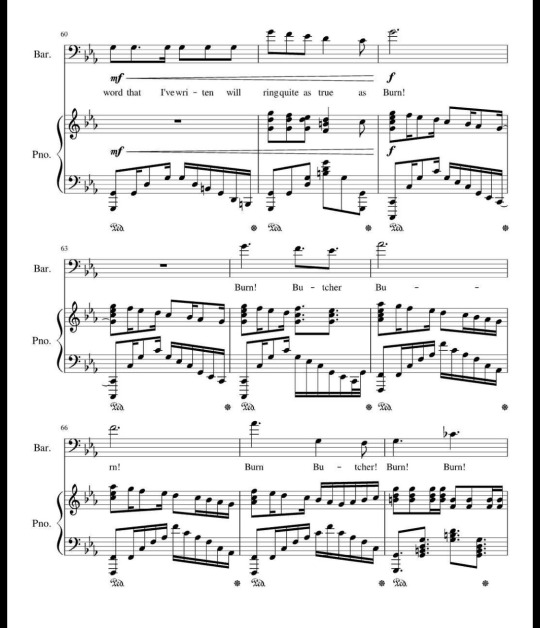
My musician friend pointed out how there’s a lot of ascending and descending notes in this part, which helps to reflect Jaskier’s inner turmoil and his overwhelming emotions.
Burn, Butcher, burn! Burn! Butcher, burn!
At the end of it all, in spite of all his anger, there’s also a sense of desperation. Maybe Jaskier is trying to get Geralt out of his head, forget all that happened, but he can’t. He’s still writing songs about him, at the end of the day.
Maybe he wants to burn the Butcher, as a separate entity to Geralt. He wants to forget the hurt he’s been caused, and wants Geralt to change. Maybe Jaskier wants to see him as heroic again.
He’s angry. But he’s not as over it as he says he is.
Burn! burn! burn! burn. burn. / Burn, burn, / Burn…
As he sings, he gets more overwhelmed, the anger leaves, there just seems to be a bit of a numbness leftover after everything. Jaskier isn’t someone who gets angry often, and he seems to dislike the feeling. It exhausts him. In a way that he doesn’t usually get exhausted after a performance.
Watch me burn… / All the memories… / …Of you.
After the song, he insists that it ‘could be about anyone’ before finally admitting it’s about Geralt. He’s ashamed of the fact he’s still effected by him, and afraid to admit that the song ‘came from the heart. Perhaps a broken one’.

If that’s not enough proof that he had a major crush on Geralt, I don’t know what is.
#jaskier#geralt of rivia#the witcher#geraskier#burn butcher burn#twn#the witcher netflix#joey batey#song analysis#jaskier analysis#burn butcher burn analysis#the witcher season 2#the witcher analysis#a humble bard#spotify
99 notes
·
View notes